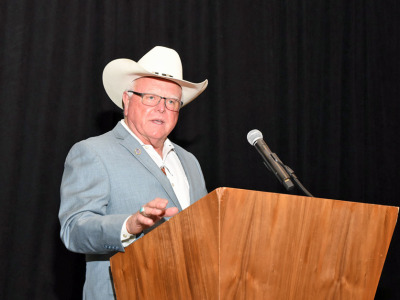A congressional proposal to bar states from regulating agricultural products produced or manufactured in other states has divided governors and state agriculture officials.
The Ending Agricultural Trade Suppression Act — meant to do away with animal housing regulations like California’s Proposition 12 and Massachusetts' Question 3 — has been welcomed by politicians in states like Iowa and Kansas who are concerned their states’ producers will have to deal with a patchwork of different state regulations to sell their products. Sen. Roger Marshall, R-Kan., is the lead sponsor of the bill in the Senate; Rep. Ashley Hinson, R-Iowa, is leading the companion measure in the House.
But the bill has also drawn opposition from those who feel such decisions should be left to states. Opponents, who range from Capitol Hill liberals to states’ rights advocates, worry the bill’s impacts would extend beyond just animal housing regulations, potentially disrupting state-level seed standards, invasive pest protection laws, food safety laws, infectious disease protection laws and other animal welfare laws.
State agriculture departments across the nation have some “differences of opinion” on Proposition 12, National Association of State Departments of Agriculture CEO Ted McKinney told Agri-Pulse at the group’s annual meeting in Cheyenne, Wyoming.
Several state ag leaders would like to see more consistency amid the prospect of a “patchwork quilt” of different state regulations that could spring up after the Supreme Court decided to uphold the ballot initiative, McKinney said, noting the current system could lead to states implementing “tit-for-tat” policies in the future.
While the EATS Act — on which McKinney said NASDA does not have a position — is one potential way to move forward, he said tighter requirements for state ballot initiatives may be another.
“We have enjoyed a lot of open trade under the Commerce Clause; this was a new factor,” McKinney said of Proposition 12. “But I think most of our members would say, ‘Yes, if it can be done, we’d really like some uniformity.'”
 California Ag Secretary Karen Ross
California Ag Secretary Karen RossProposition 12, which requires producers to comply with specific pen-size requirements to sell their pork, eggs or veal within the state of California, is currently in effect, though noncompliant pork in the possession of distributors or end users as of July 1 can still be sold until Dec. 31, according to the California Department of Food and Agriculture. The agency is currently working to certify third-party inspectors that can vet farms for compliance, California Agriculture Secretary Karen Ross told Agri-Pulse. She said both certifications and paperwork will be “key” to the agency’s enforcement efforts.
Ross said California’s defense of Proposition 12 in its court case against the National Pork Producers Council — which resulted in the Supreme Court upholding the ballot measure — reflects the state’s position on the EATS Act. The bill, she said, goes against the wishes of California voters.
“Congress can do anything they want to,” Ross told Agri-Pulse. “That doesn’t mean the state of California would support that. And I think our position is very clear because you don’t just willy-nilly decide you’re going to defend something in the Supreme Court.”
Ross also said the impacts of the EATS Act could potentially extend past animal housing laws and into other environmental, consumer protection and labor laws.
“It impacts more than just this one proposition,” Ross said. “It has a very far-reaching impact to states’ rights."
Mike Naig, Iowa’s Agriculture Secretary, told Agri-Pulse he’s supportive of the EATS Act, which he argues would reset the “ever-changing patchwork” of animal housing regulations. USDA's National Agricultural Statistics Service ranks Iowa as the top pork-producing state in the U.S., with an inventory of more than 24 million hogs as of Dec. 1, 2022.
Naig said the EATS Act may have implications outside of just agriculture, but he said lawmakers can work through concerns about impacts on other industries as they fine-tune the bill.
“What you’ve got here at its core is that you’ve got a state imposing its consumer preferences on another, and we think there needs to be a reset there,” Naig said.
Delaware Agriculture Secretary Michael Scuse is also supportive of the bill.
“I don’t think the states should, in fact, have the right to dictate how I’m going to produce poultry in Delaware or pork in Iowa,” Scuse told Agri-Pulse. “It’s bad enough that we have foreign countries that want to dictate how we produce crops and how we produce poultry and livestock without our own states here in this country.”
Virginia Department of Agriculture and Consumer Services Commissioner Joseph Guthrie, whose state is the headquarters of pork giant Smithfield Foods, said efforts like Prop 12 will make the state’s pork industry less efficient. Lower efficiencies result in higher costs for producers, which are passed on to consumers, he added.
Don't miss a beat! Sign up for a FREE month of Agri-Pulse news! For the latest on what’s happening in agriculture in Washington, D.C. and around the country, click here.
Guthrie did not take a position on the EATS Act specifically, but said he believed it was important for Congress to look at passing legislation addressing interstate commerce of agricultural products.
“It's up to Congress to create laws that impact interstate commerce, not the states themselves,” Guthrie said. “So I think that’s a really important question and it's one that the Supreme Court is looking for Congress to answer.”
Texas Agriculture Commissioner Sid Miller, however, said it would be "bad business" to put the EATS Act in the farm bill. He called the legislation an "overreach of government powers" and said it goes against states' rights.
 Texas Ag Commissioner Sid Miller
Texas Ag Commissioner Sid Miller"I don't agree with Prop 12 in California, but I'll defend California to my dying day on states' rights," Miller told Agri-Pulse.
The EATS Act has attracted attention from governors as well. The National Governors Association, a bipartisan group of governors from 55 U.S. states and territories, waded into the EATS Act conversation last week by including a request for Congress to “avoid preempting state-level laws regarding agriculture production” in its farm bill wish list.
Wyoming Gov. Mark Gordon told Agri-Pulse he believes states are where “the best regulation is coming from,” since they have the “best instincts on how to manage resources on the ground.” Congress should be cautious in considering bills like the EATS Act, he said.
“In my view, this EATS Act proposal needs to be very carefully looked at,” Gordon said. “Any time the federal government tries to override state law, state regulation, I think it’s a mistake.”
The bill has several gubernatorial supporters. Republican governors from eleven pork-producing states — including the leaders of Iowa, Nebraska, Missouri and Virginia — wrote to House and Senate leaders in June following the Supreme Court’s decision asking them to use the Commerce Clause to preempt state law. The situation, they argued, is one where federal legislation is both “appropriate” and “necessary.”
“The policy and moral preferences of voters in one state should not — and cannot — dictate how farmers raise their crops and livestock across the country,” they wrote.
For more news, go to Agri-Pulse.com.


